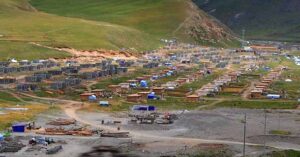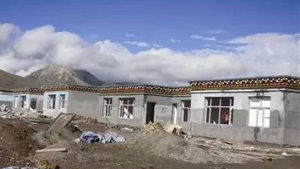Over 50,000 Tibetan herdsmen have abandoned their nomadic style of life so as to preserve the fragile ecology in Northwest China’s Qinghai Province since 2005, according to China in a report released mid-April.
This came as a result of the Sanjiangyuan Nature Reserve project which was established in Qinghai in 2000 and was later approved by the State Council in 2004. Under this programme, resettlement played a major role in the ecological conservation of the zone.
Sanjiangyuan in Chinese means “source of three rivers”, referring to the Yangtze, Yellow and Lancang (Mekong) rivers.
However, critics argue that this project was a political move by the Chinese government by which it intended to assert control over the Tibetan nomads and to exploit their lands for mining, tourism, and other commercial purposes. Critics have gone as far as to call this forced resettlement initiative “a euphemism for cultural genocide”.
In March, 12 families from Chamdo prefecture’s Gonjo county were forcibly evicted after resisting Chinese orders to move from their resource-rich ancestral lands, according to sources. These families had held out from moving for months despite being promised new housing and land in Kongpo prefecture in the south.
China’s report suggested that the nomads were resettled in better environments with improved living conditions. However, there have been several reports by international human rights groups that contradict these claims.
These reports say that a lack of alternative means of livelihood has reduced the once proud and self-sustaining nomadic community to being entirely reliant on the government’s meagre subsidies and limited state aid.
These subsidies go primarily towards buying necessities like yak milk, cheese and butter which the nomads would never have needed to buy earlier, the reports say.
Moving these nomads from under the open skies to concrete jungles has done no good towards their social upliftment either. There are no schools apart from the ones that carry forward state-sponsored “Love the motherland” propaganda, Olivier de Schutter, the UN Special Rapporteur on the Right to Food, is quoted as saying in firstpost.com.
As a result of this, there are very limited options to educate and train these nomads to take up modern jobs, provided they wanted to be educated in the first place. No such programmes appear to be in the pipeline either, according to Tenzin Norbu, a senior researcher in the environmental engineering programme.
By relocating these nomads out of their ancestral homelands under the premise of ecological preservation, China has effectively played a major hand in the loss of a more than 8000-year-old cultural heritage.






 Print
Print Email
Email